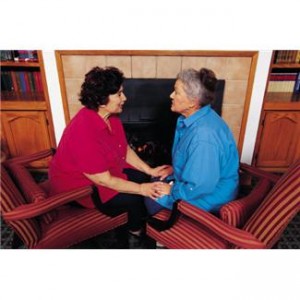Have you ever noticed that when something bad happens–a death, perhaps, or a serious illness–responses fall into one of three categories?
- “Well, let me tell you about when my mother died/I found out I had breast cancer”–and then we’re off to the races with a blow-by-blow account of what
 happened.
happened. - “Oh.” Then the person changes the topic entirely.
- “I’m so sorry to hear that. You must be hurting. Do you want to talk?”
I fell into the first category when I was young, thinking I was being empathetic/showing the person I’d been there and understood.
Then my mother died of a heart attack when I was thirty-three. And you know what? The people like me drove me crazy, almost as much as those who never acknowledged her passing. The stories of “My mom had a heart attack but they got her to the hospital in time and now she’s running marathons” or “Be happy she went quickly. My father had Alzheimer’s and ….” seemed ill-timed and self-centered.
I realized that while I might be interested in those stories in another time and place, I couldn’t have cared less in the weeks right after Mom died. The people I held close to my heart then weren’t always my best friends. Sometimes, they were co-workers I barely knew other than to say hello to. But they stopped and looked me in the eyes, generally touched my shoulder or hugged me, and said something along the lines of “I’m so sorry. How are you doing?”
I was reminded of this in 2008 when my retina detached during a trip to Istanbul. Now, I’ve got the best retinal detachment and recovery story in the world, OK? But I’m not going to tell it to you when you’re talking about your own eye problems… because at the time, I couldn’t have cared less about your Uncle Henry’s failed cataract surgery or your successful Lasix procedure.
It all comes down to one thing: When someone’s hurting (or, for that matter, celebrating) in a major way, one of the greatest gifts we can give is to let it be about them–not about us.
Wow can I identify with this. You are right on. I just hope that I remember how it felt when people I thought I could talk to just used my emotions to launch into their own story. I hope I’m a better listener when someone needs my ear.
You are a great listener, friend. Thank you for that.
I agree with you–and I pray I remember that the next time someone needs me to listen. The one thing someone said to me, when I was going through the most painful time in my life, was, “Whatever you’re feeling, it’s OK.” She had been through a similar experience. But, she didn’t tell me about then, or compare our feelings. She gave me permission to feel–all the pain, confusion, and everything else I couldn’t identify. And, I fell back on that wisdom so many times. There was time later to analyze feelings in light of Scripture, let God correct unhealthy ones, choose which ones to carry forward. But, when I was hurting, I needed permission to hurt.
Mel, this is said with excellence and is clear and direct. In my work with nurses, we talk a lot about listening and how we must remember that it is all about them. I want to remember this always.
Yes and amen! Thanks for putting this into words for me. There’s a time to share your story and a time to refrain, and may God give me the grace to know the difference.
Thanks, Patty. To everything, there is a season!
Thanks, Rita. I would think it would be especially hard as a nurse, with so many similar situations, not to share some commonalities.